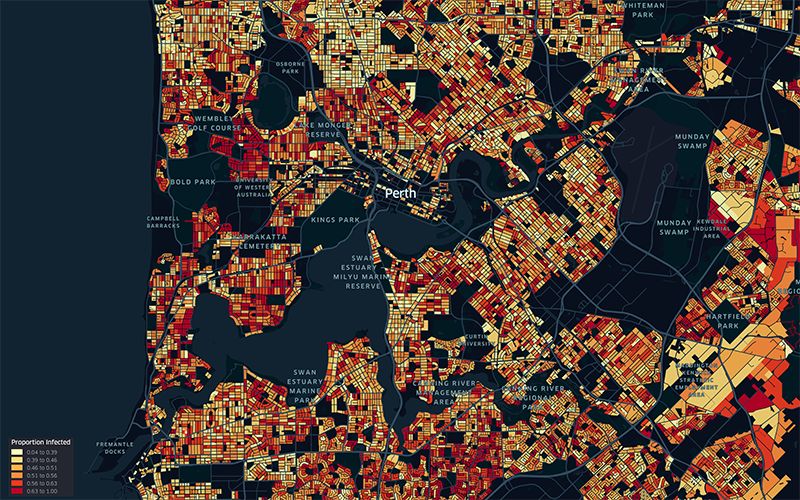Search
Research
Cholera risk in Lusaka: A geospatial analysis to inform improved water and sanitation provisionUrbanization combined with climate change are exacerbating water scarcity for an increasing number of the world’s emerging cities. Water and sanitation infrastructure, which in the first place was largely built to cater only to a small subsector of developing city populations, is increasingly coming under excessive strain.

News & Events
International funding boost for global malaria researchThe Malaria Atlas Project (MAP) – which houses the world’s largest malaria database and is at the forefront of efforts to track and tackle the disease – has been awarded more than $16 million by the Bill & Melinda Gates Foundation.

News & Events
Sophisticated new modelling suggests keeping mask mandate could prevent 147,000 COVID-19 casesWA’s current Omicron COVID-19 outbreak could jump by 147,000 cases if mask mandates are abandoned before the Easter long weekend, according to sophisticated new modelling.
Research
Burden of disease scenarios for 204 countries and territories, 2022-2050: a forecasting analysis for the Global Burden of Disease Study 2021Future trends in disease burden and drivers of health are of great interest to policy makers and the public at large. This information can be used for policy and long-term health investment, planning, and prioritisation. We have expanded and improved upon previous forecasts produced as part of the Global Burden of Diseases, Injuries, and Risk Factors Study (GBD) and provide a reference forecast (the most likely future), and alternative scenarios assessing disease burden trajectories if selected sets of risk factors were eliminated from current levels by 2050.
Research
See, Treat, Prevent Skin Sores and Scabies (SToP) TrialHealthy skin is important for maintaining overall health and wellbeing. Some skin infections, if untreated, can lead to serious downstream health complications such as heart disease, kidney disease, or sepsis.
Research
Airway management in the paediatric difficult intubation registry: a propensity score matched analysis of outcomes over timeThe Paediatric Difficult Intubation Collaborative identified multiple attempts and persistence with direct laryngoscopy as risk factors for complications in children with difficult tracheal intubations and subsequently engaged in initiatives to reduce repeated attempts and persistence with direct laryngoscopy in children. We hypothesised these efforts would lead to fewer attempts, fewer direct laryngoscopy attempts and decrease complications.
Research
The effect of the COVID-19 pandemic on paediatric anaesthesia research as evidenced by the contrasting recruitment experiences of centres in Australia and ScotlandBritta Regli-von Ungern-Sternberg AM FAHMS MD, PhD, DEAA, FANZA Chair of Paediatric anaesthesia, University of Western Australia; Consultant

Research
The future of paediatric obstructive sleep apnoea assessment: Integrating artificial intelligence, biomarkers, and moreAssessing obstructive sleep apnoea in children involves various methodologies, including sleep studies, nocturnal oximetry, and clinical evaluations. Previous literature has extensively discussed these traditional methods.
Research
Pediatric airway managementChildren are at risk of severe hypoxemia in the perioperative period owing to their unique anatomy and physiology. Safe and effective airway management strategies are therefore key to the practice of pediatric anesthesia. The goal of this review is to highlight recent publications (2019-2021) aimed to advance pediatric airway safety and to highlight a proposed simple, pediatric-specific, universal framework to guide clinical practice.
